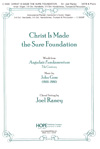284
God Is Known Among His People
Copyright Information
- Text Copyright
- © 1987 Faith Alive Christan Resources
- Tune Copyright
- Public Domain
- Reprint/Projection Information
- Words: Permitted with a license from CCLI.com or from OneLicense.net. If you do not own one of these licenses, please contact the copyright holder for permission.
- Music: The Music is in the Public Domain; you do not need permission to project or reprint the Music.
Scripture References
Thematically related:
-
st. 1 =
-
st. 2 =
-
st. 3 =
-
st. 4 =
Further Reflections on Scripture References
Ancient tradition suggests that this psalm was composed after the destruction of Sennacherib's army outside Jerusalem (2 Kings 19:35). The psalm's main theme develops in the opening and closing stanzas (vv. 1-3, 11-12; st. 1, 4): God defends Zion and makes his name known; God requires commitment, worship, and praise, even from the kings of the earth. The seven Hebrew lines (vv. 4-10) that link the psalm's framing verses celebrate God's awesome act of judgment that brought relief to Zion: God's unequaled power overcomes human might (st. 2), and not even human hostility can frustrate the plans of the God who pronounces judgment from heaven (st. 3). The theme of God's protection of Zion links this psalm with 46 and 48 (see also 84, 87, 122, 125, and 137). The versification is significantly revised from that in the 1912 Psalter.
Psalter Hymnal Handbook


 My Starred Hymns
My Starred Hymns






